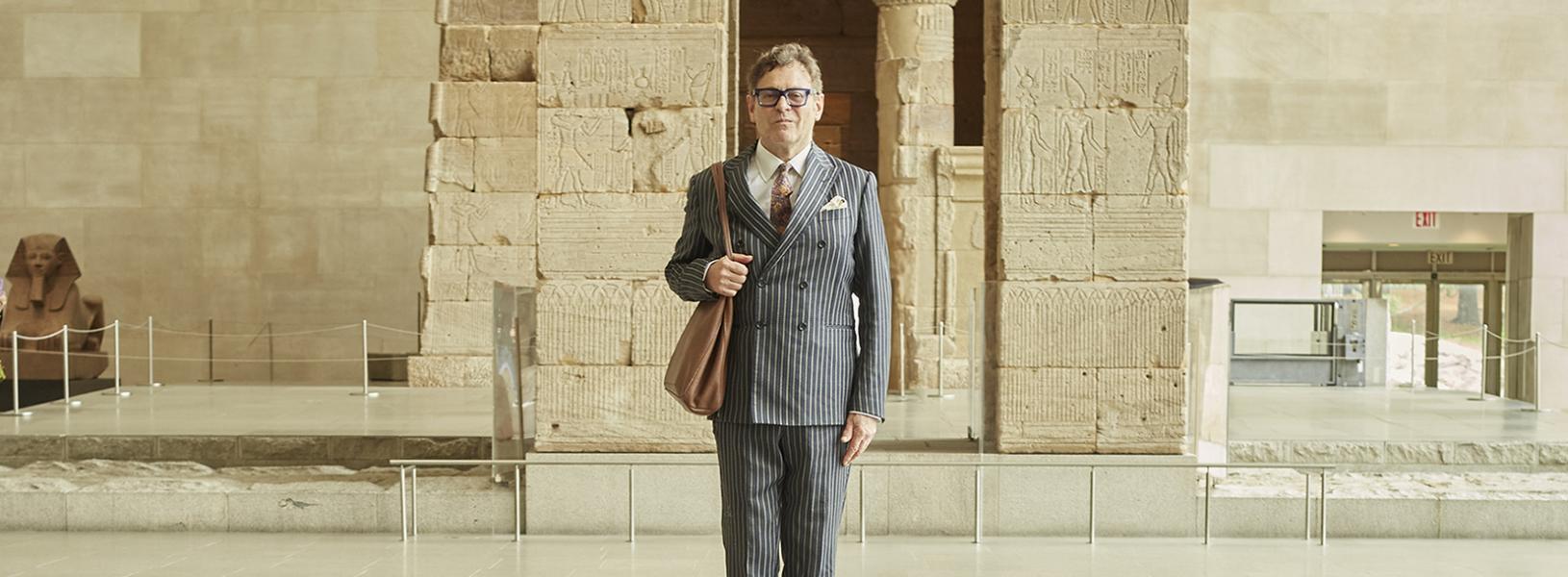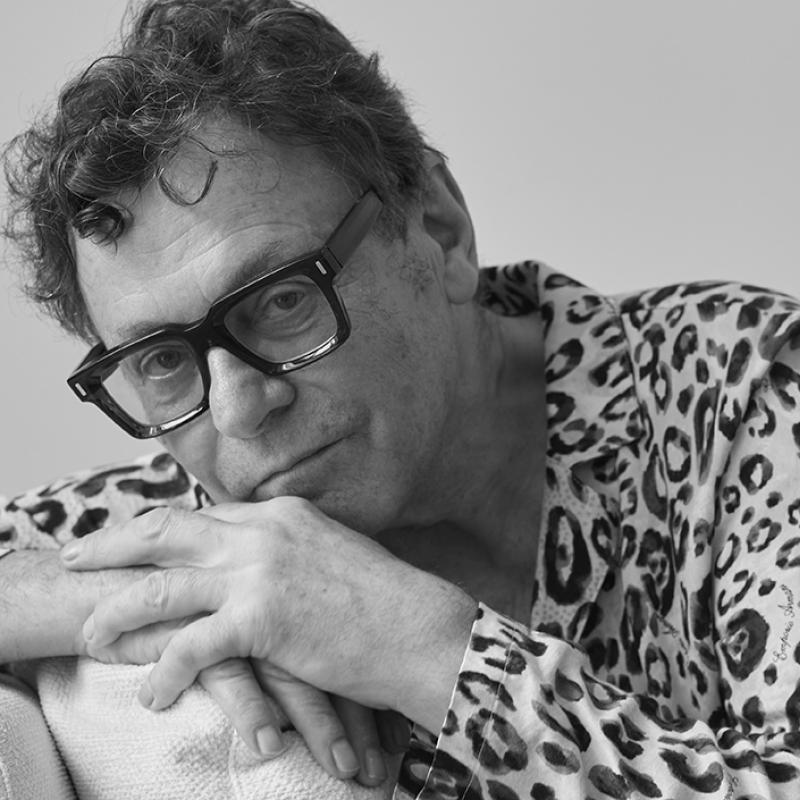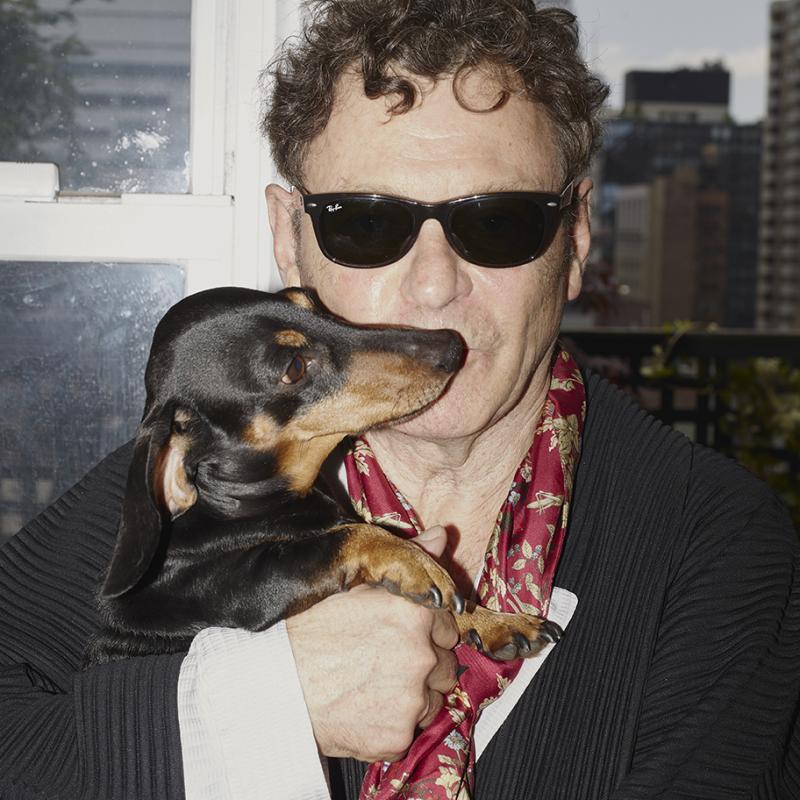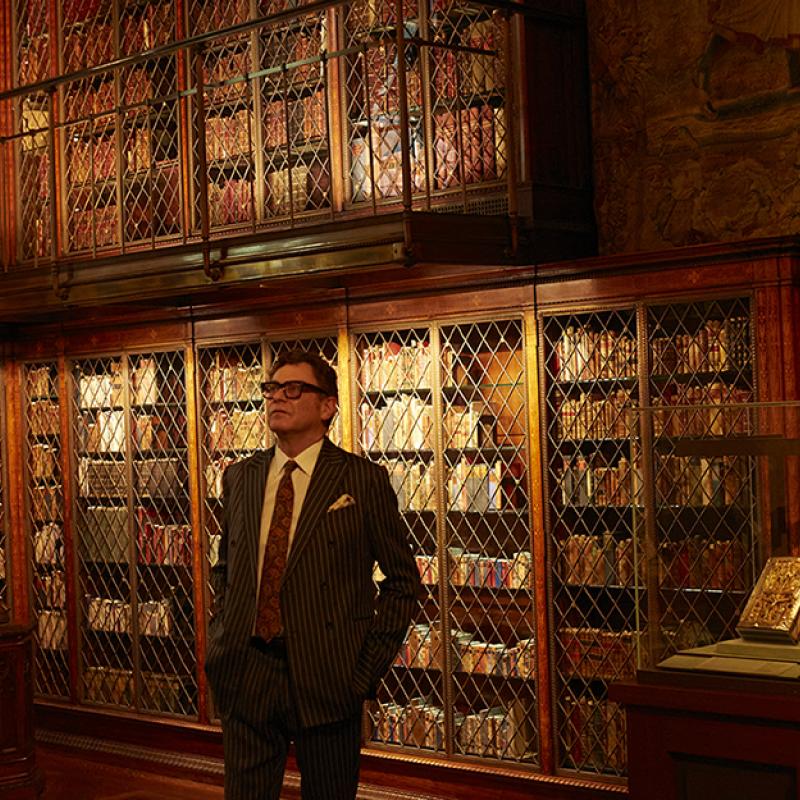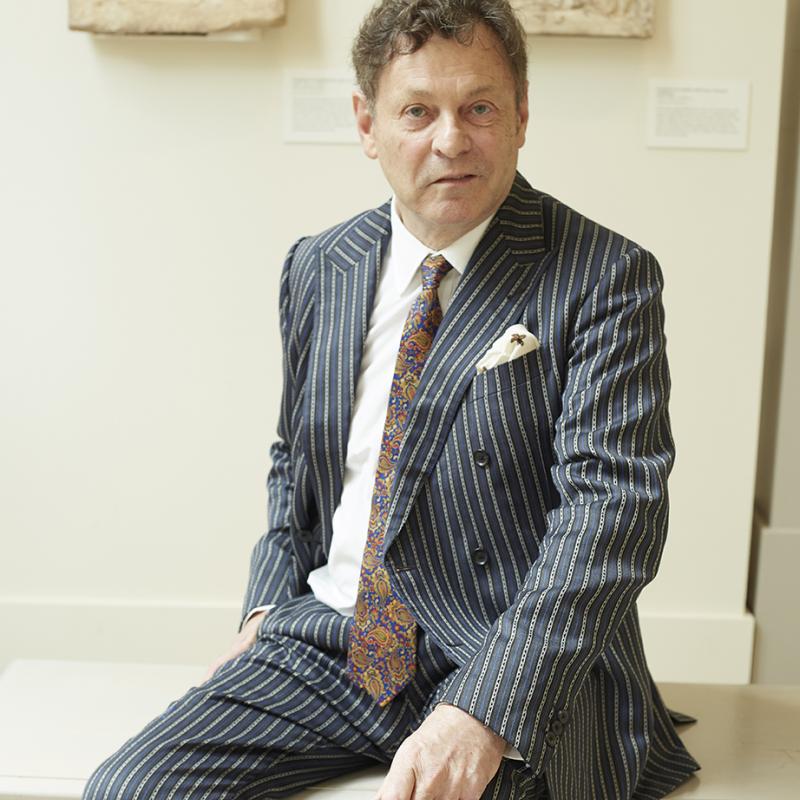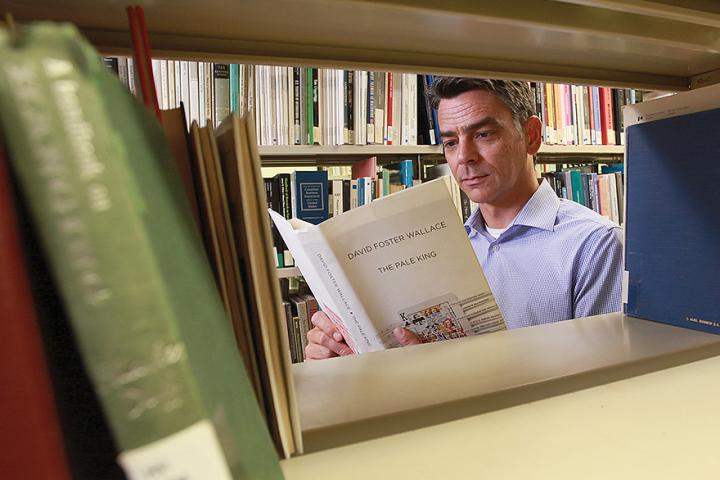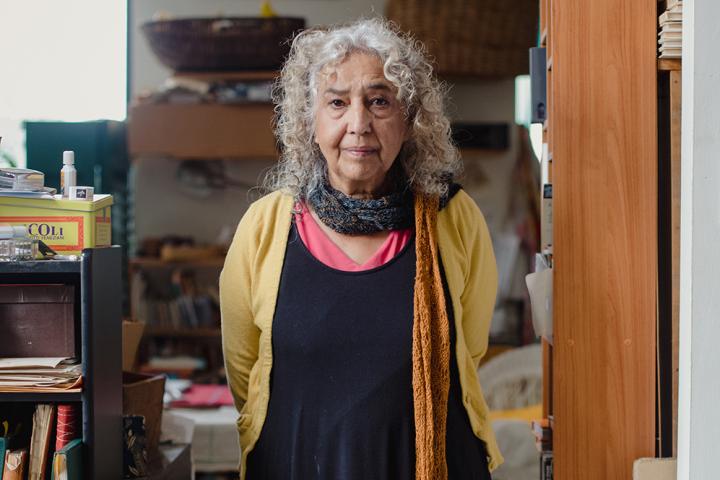There’s a fleeting scene in a 2020 Nowness documentary about Bruce Bailey where he echoes the pose from Jacques-Louis David’s iconic painting The Death of Marat – in a bathtub, head slumped, his right arm hung loosely over the rim.
The documentary, The Last Salonnier, is a testament to the rise of Mr. Bailey (Artsci’76) since his time at Queen’s. He’s not a household name in Canada, nor does he wish to be, though he’s internationally regarded as an investment banker, art collector, patron, and philanthropist who has donated and raised millions of dollars. He is one of the most influential people in the Canadian art scene today – or, as he says, “a connector, a collector, a curator.”
The Montreal Museum of Fine Arts (MMFA) is so grateful for his support that it recently named an interior gathering room the “Espace Bruce Bailey.” In 2020, the MMFA held an exhibition of art from his personal collection, built on works that deal with “good, evil, beauty, sadness, neglect, and ugliness in humanity,” the museum said. “The dichotomies of life/death, black/white, good/bad, and love/hate reflect all facets of the human condition.”
The themes allude to his mortal pose in the tub, for its message, not explained in the documentary, is a profound insight into the man who has packed a lot into one biography.
“I see life as a very transitory thing,” Mr. Bailey says. “I’ve had a lot of death in my family.”
He speaks of his sister, Linda, “my closest friend,” who died of cancer at 43, her husband, John Gilchrist, who died in a car crash, and a brother, John, who died in an accident. Their mother, Jessie, committed suicide in 1973. His father, William, died in 2004.
“I’m the last person in that primary family unit. Fortunately, I have a son and a niece, and I just decided to really try and live life every day. So, I think that message was meant to be kind of that we’re having a great time, but death and disaster are never too far away in my psyche.”
Struggle has crossed generations in his Presbyterian family. Though he “wouldn’t change a thing” about his childhood, there was an alcoholic parent, “which is not a great thing to have happen to you.” He speaks admiringly of his widowed grandmother, Helen Forbes Bailey, and how she raised three children during the Depression, yet managed to run a soup kitchen and feed “long lineups of jobless men.”
As an adult, he’s had trials that could destroy a person: in the mid-1980s he came out, losing both his marriage and his job at a Toronto investment firm. With support from a friend, he launched his own firm, headquartered in Toronto with branches in Palo Alto, Calif., and Geneva, Switzerland, and prospered. He later married Spanish philosopher Alfredo Ferran Calle.
Mr. Bailey has become an influential figure who is so memorably sociable and simultaneously elusive to media exposure that he’s been called “Canada’s Gatsby,” after F. Scott Fitzgerald’s enigmatic, doomed character.
“I’m not Gatsby,” he says, laughing. “Gatsby didn’t have any friends. I have a lot of very loyal friends of all ages, and my life is not going to end the Jay Gatsby way. I think superficial people use the Gatsby thing because I throw a good party, and the reason I throw a good party is that during my childhood and adolescence I never had a party. I never had a birthday party, I never had a Christmas party, we never had any presents, we didn’t have any celebrations.”
He did have a rare family trip to Paris, where he had a fortuitous encounter with the power of art while looking, perhaps coincidentally, at another French masterpiece of watery death.
“That child who was transformed was me looking at [Théodore] Géricault’s Raft of the Medusa in the Louvre. That was my revelation of, ‘Oh my God, this is so incredible.’ I didn’t want to leave, and it was closing time, and I was kind of transfixed. That was the watershed moment when I realized I did want to have art in my life, and that it was something that really excited me.”
Decades later, his faith in art seems unshakable. To a statement about rationalizing whether to spend money on a piece of art that one doesn’t need, per se, he responds, “You probably need it more than anything else.”
That brief answer is another insight into his culture, philosophy, and even his political perspective, all of which seem to revolve around art.
“The thing that most Canadians are missing in their lives is art, music, and culture, because our education system in a resource-based economy is completely inadequate,” says Mr. Bailey, who also studied international human rights law at Columbia University in New York, where he obtained his LLM, after he’d earned his LLB at Dalhousie University in Halifax. “Canada devalues culture, and it’s been detrimental to everybody, to people’s health, education, and enjoyment of life. You have to fill in the gaps yourself and do continuing education with opera, symphony, and art.”
Art, he says, “opens up new channels of communication in the brain, gets you thinking in new dimensions, helps you compete more effectively as a businessperson, or just in the quality of your own life, to, as Glenn Gould said, ‘create a psyche that can enjoy all the things life has to offer.’”
"I have the freedom to be nonconformist. The upside to that is that you can actually talk about real issues. The downside is maybe I’ve been a little too pedantic. Some people see someone who has that kind of freedom as a threat to the established order.”
Nathalie Bondil, the former director of the MMFA and now the museum and exhibitions director at the Institut du Monde Arabe in Paris, has written that Mr. Bailey “has such a strong vision with a high ambition for culture. It’s really a question of sharing a heritage and also enhancing togetherness throughout the country. It’s not a question of collecting contemporary art but truly what could you do with art? What could you give to make our society even better?”
Mr. Bailey gives his own money so young people have avenues to art they might otherwise not have. He supports programs to give students free admission to museums, for example, or supports young people at The Royal Conservatory of Music.
Young people also attended a post-pandemic fundraiser for the Montreal Museum of Fine Arts and the Canadian Opera Company at his farm north of Toronto where, in typical Bruce Bailey fashion, he required his “rich friends” to buy tickets for $1,000 or, even better, a table for 10 for $15,000, then sat them at tables with musicians, other performers, local farmers, and young people who were sponsored to attend the event for free.
He is “trying to broaden or open up the tent,” primarily to help democratize art and share its power.
“I think it’s necessary in democracy to not only support everybody, but to give everybody opportunities,” he says, adding that the seating arrangements also “made for a much more interesting party, because the paradigm for these parties in Toronto is a bunch of bankers in a chandeliered hotel room, and they’re all tired of seeing each other because … the same people get invited to the same arts benefits.”
Another event held at his farm in 2022 – calling it a “pastoral art salon” hints at his fondness for earlier times – netted more than $1 million for the Montreal Museum of Fine Arts. A friend, Scottish artist Peter Doig, also donated a painting valued at $4.1 million to the museum.
Quebec, Mr. Bailey says, takes its culture more seriously than does the rest of Canada, and after he spent time in Montreal years ago, he vowed to support the Montreal museum if he ever had the means to do so. The first outdoor salon at his farm to benefit the museum raised $433,000.
“I had a happy experience in Kingston. I think it’s because of the small size of the university, that kind of family feeling. It was perfect as a launching pad for me to transition from there to a bigger city life.”
His conversation is inexhaustible – unless he has a plane to catch, as he does on this day – and it’s festooned with sentiments of struggle by famous people, from soprano Maria Callas (“adversity is good”), to the Roman emperor and philosopher Marcus Aurelius (“love everything that happens to you, even the bad things, as you learn from them and they make you stronger”).
What wasn’t a struggle was adapting to life in Kingston and on Queen’s campus. He still has friends he met in Kingston 50 years ago – he mentions the family of Amanda and Dr. John Milliken, the latter a professor in Health Sciences, and the family of Professor Christopher Crowder, a “father figure to me” – who welcomed Mr. Bailey into their home.
“I had a happy experience in Kingston. I think it’s because of the small size of the university, that kind of family feeling. It was perfect as a launching pad for me to transition from there to a bigger city life.”
He also cites art and architecture Professor Pierre Du Prey, a “kind of eccentric art historian who had quite an influence on me in terms of looking at art in architecture.”
As a student, Mr. Bailey was “an exceedingly bright young man,” Professor du Prey says. “In those early days, I was a bit of a hard-nosed kid professor, and I didn’t give out good marks frequently, but Bruce sure got them. He had a very perceptive eye and mind, and a good vocabulary. He could easily have been a professor in art and architectural history.”
In classes, Mr. Bailey “didn’t hesitate to speak up,” the now-retired professor recalls. “He made up for the silence of those that didn’t contribute.”
The outspokenness of a precocious student has matured into a determination to speak even more loudly on behalf of those who do not, or cannot.
“I have the freedom to be nonconformist,” Mr. Bailey says. “The upside to that is that you can actually talk about real issues. The downside is maybe I’ve been a little too pedantic. Some people see someone who has that kind of freedom as a threat to the established order. I’m trying to break that mould, to bring people together, but certainly, I’m probably not everybody’s cup of tea. I’m seen as a bit of a rabble rouser, frankly … people either love me or hate me.”
However he’s seen, he seems not the least bit bothered by antipathy from some corners. As for the Gatsby thing, it’s hardly worth a sigh.
“I’m a pretty private person,” he says, citing a quote attributed to the great proponent of individualism, Ralph Waldo Emerson: “The fate of the well-known is to be misunderstood.”
